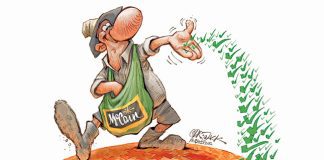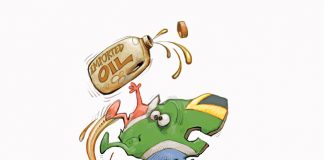What will be said in the forthcoming State of the Nation address? Unfortunately, many left-leaning analysts in South Africa will write economically illiterate nonsense about the need for high minimum wages, more black economic empowerment (BEE), faster land reform and wealth taxes.
President Jacob Zuma, too, has been captured by communist notions, and will probably echo these themes in his speech. The reality, however, is that they offer no hope of a better life to anyone. If anything, they deter investment and innovation and worsen the social and economic circumstances of all South Africans.
BEE should go
The government’s first priority should be to repeal all BEE and employment equity laws and regulations. These laws and policies have done incredible damage to investment and service delivery. We hear regularly, from large and small companies alike, that BEE rules stop them from expanding their operations in South Africa.
The misapplication of employment equity policies in the civil service is the reason many schools are dysfunctional, state hospitals provide such poor service, municipal infrastructure is crumbling and municipal governance is in such a dire state.
It needs to be understood that no government can run South Africa effectively while these laws and policies remain in place.
Keep property rights intact
The second priority must be to suspend all land reform efforts and repeal laws and policies that threaten property rights in South Africa. The country needs to draw massive amounts of capital into investment projects to get the economic growth rate up to 5% of GDP. This will not happen as long as investors, foreign as well as domestic, remain uncertain about whether the government will simply expropriate their assets.
In agriculture alone, there are at least six new laws and policies that would allow government to take the property and assets of farmers. Property rights are a key component of every prosperous society and need to be strengthened, not eroded, as is presently the case in South Africa.
Privatise before bailouts
The third priority must be a massive privatisation drive. Sell Eskom, SAA and every other parastatal business to the private sector, under the watchful eye of the competition commission. It makes no sense to continue wasting taxpayers’ money bailing out failed government businesses when they could be sold and run properly by private investors. Instead of consuming tax they might start contributing to the tax base.
State schools and hospitals also need to be privatised via voucher systems. Schools, for example, must be handed to private operators, churches, or non-governmental organisations.
The education budget should then be cut up into vouchers that parents can use to enrol their children in these privately run schools. The quality of the resultant market for education would quickly improve. Parents make better decisions about their own children than politicians will ever make.
A similar voucher model could be used to allow households to buy medical insurance.
Let’s get everyone working!
The fourth priority must be to repeal sections of the Labour Relations Act and the Basic Conditions of Employment Act that together place obstacles in the way of job creation. With a 50% youth unemployment rate, South Africa does not have the luxury of pontificating about ‘higher minimum wages’ or ‘decent jobs’.
At the moment, any job is better than no job. Low wage employment is better than unemployment; it offers young workers the chance to earn something and learn skills with which they might later climb the employment ladder and provide for their families. Denying poor people the right to choose to work is probably the greatest cruelty that trade unions, the government and the left have perpetrated on poor people since 1994.
Create the right environment
The fifth priority must be to emphasise economic growth over all other policy objectives. If a policy or law obstructs investment-driven growth, it must be repealed. Yet the government remains very far from this realisation. Last year, a cabinet minister called for the ‘destruction of monopoly capital’. The home affairs minister sought to wreck the tourism industry with his new migration regulations, and the minister of trade and industry seemed intent on destroying trade and industry wherever he could find it.
Proposed laws and policies on agriculture were just as mad. The world has only one economic formula. Very briefly, this is that private investors take risks with other people’s capital. In this way, they create wealth, which increases the living standards of the communities they invest in.
This is the only formula for wealth and prosperity. Yet our government takes the view that it should direct the economy by setting conditions for what investors should do. It is a foolish approach – shared by a handful of nations including Venezuela, Cuba and Zimbabwe – that largely explains our very high unemployment rate and very low growth rate. The domestic policies adopted by the government have exacerbated the problems caused by the global crisis.
The reality
Will the President make the speech the country needs to stage an economic recovery?
I doubt it. I even doubt the extent to which the opposition could commit to each of these five points (they are good on points 3, 4 and 5 but have yet to develop a clear policy on points 1 and 2).
Will any SA politician ever make such a speech? In time, somebody may be forced to. It may be worth watching the ‘ANC premier league’ which is looking to unseat Jacob Zuma. The leaders of this internal ANC movement are not democrats, but are alarmed at our economic decline and the implications for the future of the ruling party.
They seem to have doubts about the communists and in fact blame them for the damage done to the economy. With the right encouragement, they might start hauling the economy back from the brink.
Dr Frans Cronje is a scenario planner and CEO of the SA Institute for Race Relations, a think-tank promoting political and economic freedom. Contact him at 011 482 7221 or [email protected].













